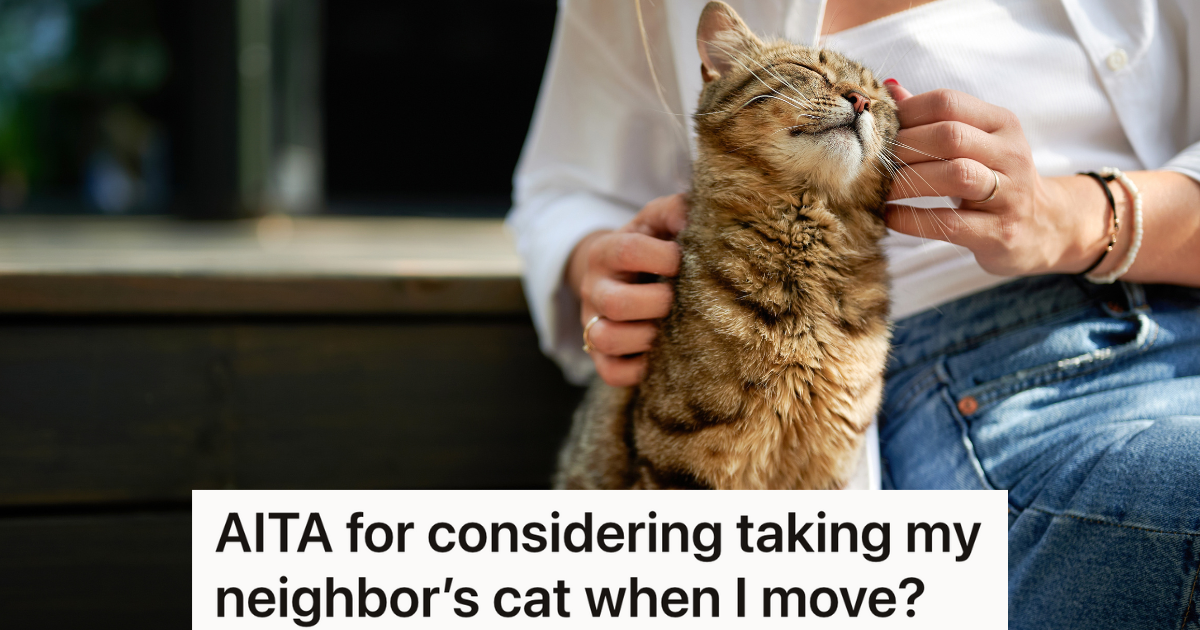A Stray Cat’s Dilemma and the Ethical Question of Ownership
Imagine this: a cat starts showing up at your apartment, becoming a regular visitor. Over time, you grow attached, and it begins to feel like part of your family. But then, one day, you discover that a neighbor is also feeding the same cat. Now, the question arises—whose cat is it? This situation has left one woman in a tough spot, especially as she prepares to move out of state soon and wants to take the cat with her.
The story began in March when a small, sweet kitten started coming to the woman’s apartment. She and her boyfriend already had two male cats, and initially, the new cat was hesitant. They took their time introducing the new feline to their home, allowing her to come and go as she pleased. After a few weeks, the cat became more comfortable and even started spending long hours with them.
As the weeks passed, the woman began to suspect the cat might be pregnant. When they returned from a week-long vacation, the cat was still visiting them regularly, which made the woman think she might have given birth. However, she didn’t search for the kittens, assuming they were lost or had been taken by the cat. The cat continued to visit, and the two male cats gradually became more accepting of her.
By the end of May, the cat was spending significant time with the couple, sleeping, playing, and snuggling with them. It seemed like she had chosen them as her home. That’s when the couple decided to take her to the vet to begin the process of adopting her. During the visit, they learned that the cat had indeed given birth to a litter and was still nursing. The vet urged them to find the kittens and ensure they were safe.
Following the cat, the couple discovered the kittens on their neighbor’s patio. They reached out to the neighbor, who claimed the cat as hers, saying she had been feeding it milk and that it was an outdoor cat. She offered them two of the kittens, which they politely declined. The neighbor explained that she worked overnight and didn’t have time to take the cats to the vet, despite the couple spending $120 on the mother cat’s care without being asked for reimbursement.
The woman and her boyfriend were now faced with a difficult decision. They believed they were the ones feeding the cat and that she had become domesticated, even though she primarily lived outside. There was no evidence of ownership, such as a microchip, and there had been no mention of spaying her. However, the cat had become very attached to them, spending more time with them than with the neighbor.
They considered taking the cat with them when they moved out of state at the end of August, but they were worried about doing the right thing. The woman was particularly concerned about the ethical implications of taking the cat if it truly belonged to the neighbor.
Reddit users weighed in on the situation, offering various perspectives. Some encouraged the woman to take the cat and also find homes for the kittens. Others warned against abandoning the kittens and suggested working with the neighbor to resolve the issue before making any decisions.
One user advised the woman to be honest with the neighbor to avoid any misunderstandings. If the cat was truly the neighbor’s, they should not take her. However, if the cat had become part of their household, they needed to communicate with the neighbor and make arrangements accordingly.
Ultimately, the woman wanted to ensure the cat received the care and love it deserved. She was torn between her growing attachment to the cat and the ethical responsibility of respecting the neighbor’s claim.
As the couple prepared to move, the question remained: was it right to take the cat, or would it be unfair to the neighbor? The situation highlights the complexities of stray animals and the emotional bonds that can form between humans and pets.
If you enjoyed this story, you might also appreciate another tale about a mother who had to bring her children with her to apply for government benefits, only to end up finding a job she loved.







